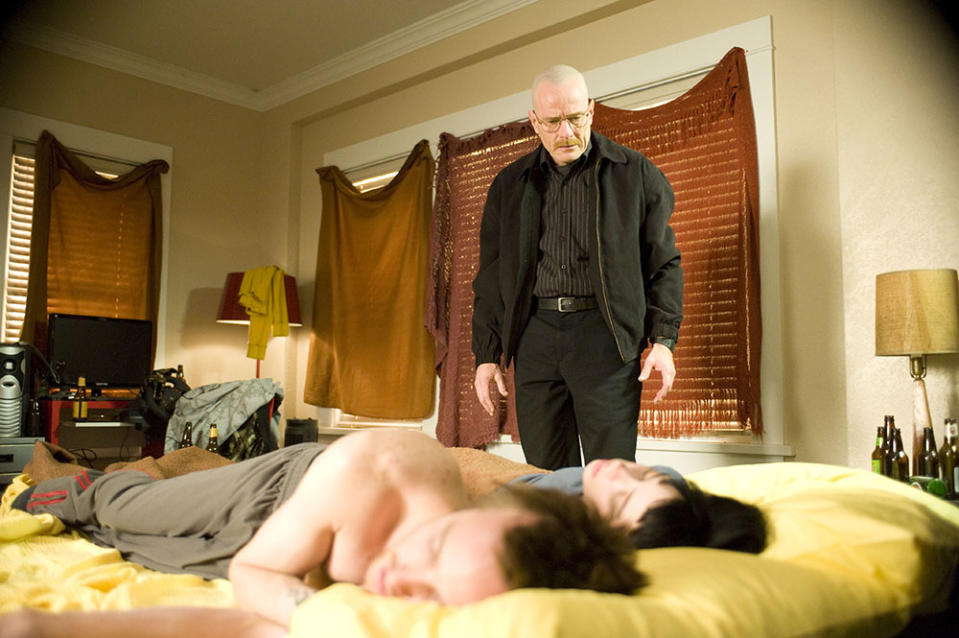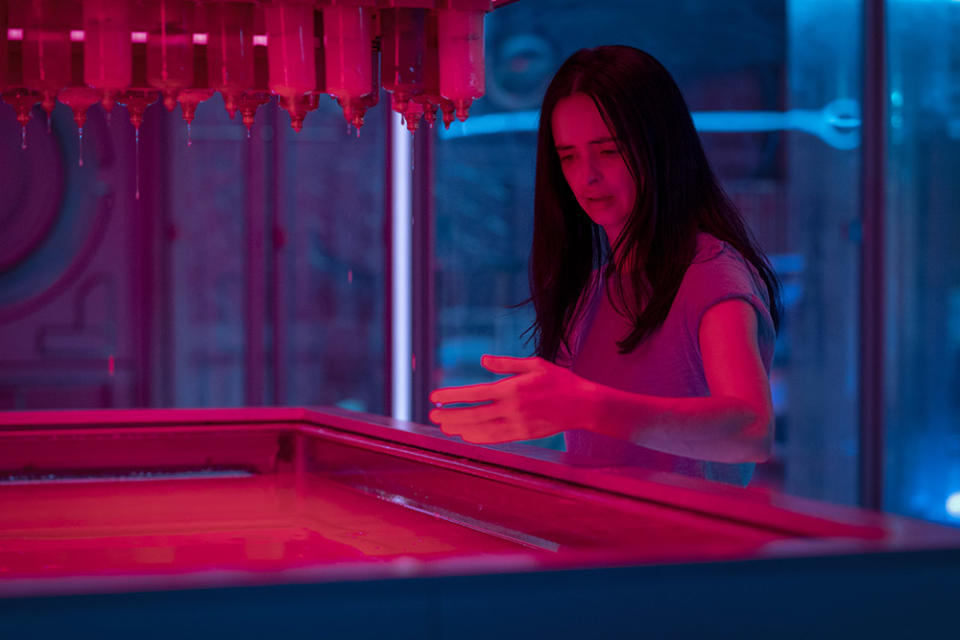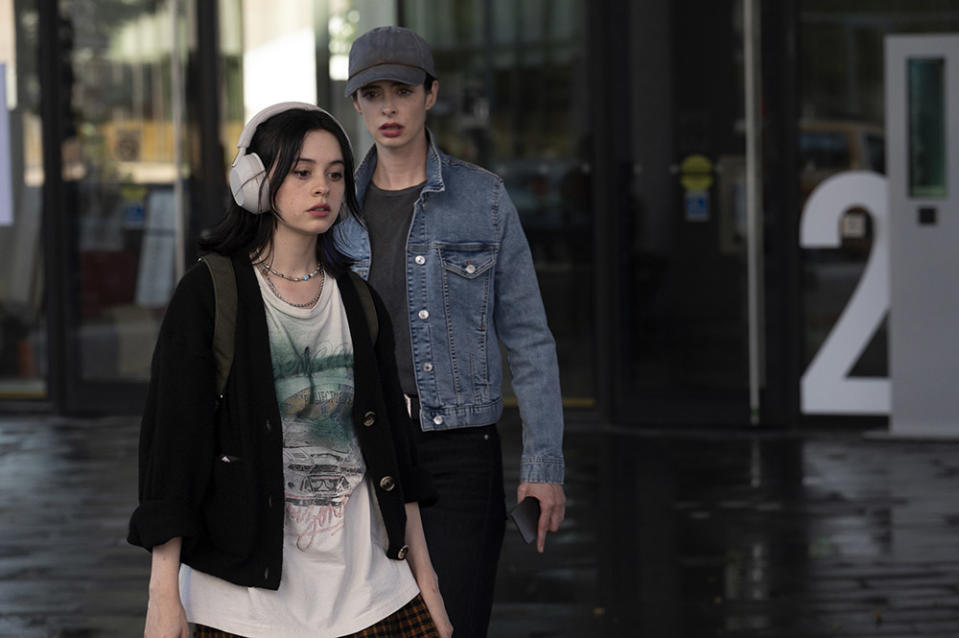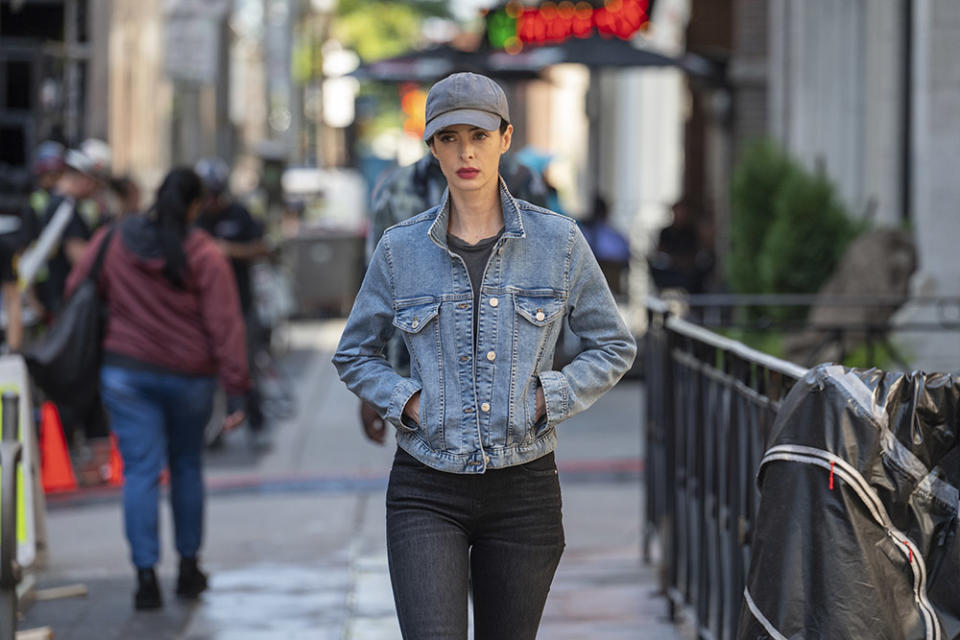Krysten Ritter Explains How Her ‘Breaking Bad’ Death Paved the Way for ‘Orphan Black: Echoes’

It’s now been 15 years since Krysten Ritter’s Breaking Bad arc came to a tragic, series-altering end. But that eight-episode run in season two of the beloved AMC series continues to bear fruit for the actor.
Last night, she made her return to the home network of Breaking Bad as the star of Orphan Black: Echoes — a spinoff of Tatiana Maslany’s mothership series that picks up 37 years later. Created by Anna Fishko, Ritter’s new character, Lucy, instead of being a clone, was recently printed into existence by a four-dimensional printer. And, despite her best efforts to create a well-adjusted life for herself in just two years’ time, she’s soon forced to piece together the puzzle of who she really is and why she was created.
More from The Hollywood Reporter
'Orphan Black: Echoes' Review: BBC America and AMC's Loose Sequel Really Misses Tatiana Maslany
Daniel Radcliffe Says He Doesn't Watch "Heavy" Dramas Like 'The Sopranos' and 'Breaking Bad'
Rhea Seehorn Talks 'Bad Boys: Ride or Die' Success and the "Wild Ride" of Vince Gilligan's New Show
The road to Echoes truly began with Ritter’s Breaking Bad character Jane Margolis, who went from Jesse Pinkman’s (Aaron Paul) landlord to the love of his life. Unfortunately, Jesse’s drug addiction and involvement in meth manufacturing triggered Jane’s own relapse after a successful 18 months in recovery. From there, Jane proceeded to meddle in Walter White (Bryan Cranston) and Jesse’s affairs, culminating in Walt’s refusal to save Jane’s life while she vomited during an unconscious drug overdose. The shocking death, motivated by Walt’s own self-preservation, marked the point of no return for the antihero character’s descent into pure villainy. (Ritter eventually came back for a flashback sequence with Paul in season three’s “Abiquiu.” The duo then extended the same flashback in Netflix’s sequel movie, El Camino.)
On the 2008 set of Ritter’s fateful season two episode, “Phoenix,” AMC executive Benjamin Davis was on hand to watch this pivotal moment unfold as part of Vince Gilligan’s now highly decorated series. The original version of the death scene had Walt inject Jane once more to cause the lethal heroin overdose. But after some pushback from AMC, Sony and Gilligan’s fellow writers, the decision was made to have Walt play more of a passive role in her demise. Davis, who was AMC’s director of development for scripted programming at the time, eventually became executive vp, and he helped bring the Ritter-led Orphan Black spinoff to fruition.
“[Ben Davis] was on set for the Jane death scene, which was fun to talk about and reminisce about and hear the behind the scenes of those conversations that were happening around Walt letting Jane die. He was a huge part of my character’s storyline,” Ritter tells The Hollywood Reporter. “I’m so thrilled that [AMC] gave me another gig. They’ve always had a very classy slate of shows. And Breaking Bad is very, very dear to my heart.”
In May 2009, just a few days before Ritter’s Breaking Bad death, her Gossip Girl spinoff Valley Girls, co-starring Brittany Snow, wasn’t picked up to series. But the disappointment didn’t last long, as Breaking Bad would go on to mark a major turning point in her career. The celebrated crime drama wasn’t yet a ratings juggernaut, but it was a critical darling that industry types and Emmy voters had embraced. The following year, Ritter became one of the most in-demand actors ahead of pilot season, and that eventually led to her January 2011 casting as the title character in Nahnatchka Khan’s sitcom Don’t Trust the B— in Apartment 23. She ended up filming 26 episodes, which aired from 2012 to 2014.
At the end of 2014, as Ritter was auditioning for Netflix’s Jessica Jones series, she also went out for Fargo season two. Kirsten Dunst ultimately landed that role, which would introduce her to her onscreen and future offscreen husband Jesse Plemons. But Ritter, in turn, netted the Marvel antihero part of Jessica Jones. She made a point to bring all of this up to Plemons when they worked together recently on David E. Kelley’s Love & Death for Max.
“It was a win-win for everybody! I mentioned it to [Plemons], and I also worked with Kirsten a million years ago in my very first movie, Mona Lisa Smile, where I had one line,” Ritter says. “So I got a call that said Fargo wasn’t going to go my way, but I was in the mix for Jessica Jones. I was like, ‘Wait, what?’ I wasn’t expecting either piece of information, and that was 10 years ago now. Crazy.”
As for the future of Jessica Jones, Ritter is ready at a moment’s notice should Marvel Studios come knocking. The odds of a return increased significantly when Ritter’s former The Defenders castmate Charlie Cox had his new MCU series, Daredevil: Born Again, revamped midproduction. Marvel Studios, after reviewing early footage, opted to pivot in several ways, while also resuming some of the storylines and continuity of the universe that Marvel Television originally produced for Netflix. Marvel Studios streaming head Brad Winderbaum has since confirmed to THR that all of the former Netflix shows are now considered MCU canon, including Jessica Jones, which currently resides on Disney+ along with its sister shows.
“I am ready and I would, of course, be there in a heartbeat. She’s a character who I absolutely love, and she was a part of my life for so long,” says Ritter. “So if the opportunity calls, I may or may not have an extra jacket already. Fingers crossed, you never know. But that would be exciting, of course.”
Below, during a recent conversation with THR, Ritter also discusses how she approached Orphan Black: Echoes and the unique dynamic of playing an adult character who has no backstory or identifiable memories.
***

The one Orphan Black: Echoes connection I found to Breaking Bad was Russell Scott, Echoes’ casting director. He was a casting associate on Breaking Bad and later worked with Sharon Bialy and Sherry Thomas as co-casting director of Better Call Saul.
Oh, really? That’s cool. I was so young when I auditioned for Bialy-Thomas. Reed Diamond is also in this show, and he was in The Girl in the Woods, which is the Peacock show I directed. So I got to act opposite him this time. [Writer’s Note: Diamond also appeared on the final season of Better Call Saul.] And then James [Hiroyuki Liao] is a longtime client of my longtime acting coach, Marjorie Ballentine. So we had that connection as well, but that’s where it ends. Normally, when you’re on set, you know somebody: “Oh, you worked on this, you worked on that, I’ve seen you on this other set.” But I didn’t know anybody in Toronto other than a couple of important and exciting overlaps.
When you were approached about an Orphan Black spinoff, did you immediately pack your bags for Canada? Or did you need to deliberate?
It was a little bit of both. It was very appealing to me how much my character got to do. I read the pilot and I was deciding between three shows at the moment, but this was the clear and simple decision based on how much I got to do. I’m somebody who loves full immersion, and I love to play as many colors as possible. I had to learn ASL, I had to learn Spanish, I got to carry a gun and drive a big truck. So there was a lot going on in this one, and I have great relationships with the other women in the show. Lucy is also in love with Jack [Avan Jogia]. She is a mother figure to Charlie [Zariella Langford]. So all of these different relationship dynamics were very appealing to me. But going to Toronto with my small child is a big undertaking. So, of course, there was the balance of motherhood. How do you do it all? But we packed a lot of bags with a lot of toys, and we went on an adventure.
The reason I ask is because I still remember a 2009 episode of the Breaking Bad Insider Podcast where Vince Gilligan and company talked about your Gossip Girl spinoff. It was on the verge of going at the time of their recording, but then it later fell apart on the one-yard line. I wondered if that experience made you wary of spinoff series at all.
Wait, Vince talked about my Gossip Girl spinoff?
Yeah, I’ll link to the episode in this piece. Breaking Bad did behind-the-scenes podcasts for every episode, minus the first season.
Oh my God, I would give anything to listen to that podcast. This is all new information. Breaking Bad is what changed things for me. Prior to that point, I was just taking whatever job I could. And, obviously, Gossip Girl was huge. The spinoff was expected to go, but it didn’t. And that’s OK, because then I got Don’t Trust the B— in Apartment 23 immediately after that. It ended up being one of the absolute best roles and jobs I’ve ever had. So I just go with it. There’s no crystal ball. If you overthink things and act out of fear, you’re going to get yourself into trouble.
With Orphan Black: Echoes, the TV landscape is challenging now. It’s hard to launch a new show. There are so many platforms and, as a business decision, it’s a bonus to have existing IP and a marquee name and built-in fan base. So, that was appealing. And the reason why this one felt good to me was because it’s totally its own thing. It’s not the same DNA [as the original series]. It’s set in the same world. We’ve got clones or printouts, but it’s not the same. I’m not playing seven characters like Tatiana [Maslany]. We’re not remaking that show, so it felt like this show was also its own thing.

Echoes begins with your character waking up as an adult woman, only she had just been printed into existence. So how did you approach playing someone who was literally born yesterday?
That’s also what I thought was interesting about taking the part. Typically, I look for parts that have a very rich backstory. For example, with Jessica Jones, you always know where to go and where to pull from, because everything that she does is informed by this very tragic history that she has. So this was interesting because Lucy has no backstory. What do you do with that? The idea and concept of that was very interesting to me as an actor. It was a challenge, and it was something completely new that I’ve never done before.
So you find that thing: “What am I going to always come back to? What’s my throughline? What’s my action? What’s my signpost if I get lost? What are the rules?” I just looked at it like she was on a very determined quest to find out who she is. That’s what I always came back to with her. She has feelings, she has skills, she has an incredible brain, but she doesn’t know what to do with all of this stuff. She’s a livewire who’s on a mission to find out who she is.

During Lucy’s pursuit of the truth, she encounters a teenager (Amanda Fix’s Jules) who she thinks strongly resembles her. Was Jules a difficult role to cast since you have a rather distinct look?
Yeah, it was interesting when we started doing chemistry tests with actresses. But they did find a couple of girls who resembled me quite a lot. They also did facial recognition stuff, and I provided pictures of myself at 15. But Amanda Fix showed up to our chemistry test in a black wig, and aside from her having an obvious physical resemblance, that kind of big choice and that kind of confidence felt like fucking something I would do. I loved it.
But it was challenging. On paper, it’s one thing, and then you get there and there are conversations about making her eyebrows lower because my eyebrows are low. My lip is big, so people asked, “How do we make her lip bigger?” Everybody was having these wild conversations, and then they made special contacts for her where they scan your eyes and all of that. And then [spoiler] is wearing a nose that’s built like mine. So it was just crazy to see it come to life and to see how it was all executed with movie magic.

Late in the premiere, Lucy is wearing jeans and a hat while walking through a city, and she drops an F-bomb when someone asks her for a password. It was all very reminiscent of Jessica Jones.
(Laughs.)
I just spoke to an executive at Marvel Studios, and he confirmed that the former Netflix shows are now officially MCU canon. When they retooled Charlie Cox’s new Daredevil: Born Again show, they decided to finally embrace those past stories that were made by Marvel Television, not Marvel Studios. That means Jessica Jones is somewhere in the MCU right now. Are you keeping yourself ready for anything?
One hundred percent. I am ready, and I would, of course, be there in a heartbeat. She’s a character who I absolutely love, and she was a part of my life for so long. I played that character for five years, and she’s a character who’s very important to me and many women and men. So if the opportunity calls, I may or may not have an extra jacket already. (Laughs.)
I have the faintest memory of something, but I couldn’t track down where I heard it. Did you audition for Fargo season two?
Yeah, I did. I auditioned for Fargo and Jessica Jones in the same time frame, and it must’ve been season two. Is that the season with Kirsten Dunst and Jesse Plemons?
Yes, and you recently worked with Jesse on Love & Death. So did Fargo ever come up between the two of you?
It did come up! I mentioned it to him, and I also worked with Kirsten a million years ago in my very first movie, Mona Lisa Smile, where I had one line. So I got a call that said Fargo wasn’t going to go my way, but I was in the mix for Jessica Jones. I was like, “Wait, what?” I wasn’t expecting either piece of information, and that was 10 years ago now. Crazy.
You landed Jessica, and Jesse met his future wife, so it was a win-win for everybody.
(Laughs.) Yes, it was a win-win for everybody! And, oh my God, they’re the cutest couple ever. They love each other so much, and he’s such a wonderful actor and such a good guy. We had a great time on Love & Death. A great time.
Michael Rosenbaum and Skeet Ulrich talked recently about how quickly you can memorize lines. And as number one on the call sheet, you’re supposed to set the tone for the rest of the cast by not only knowing your lines inside and out, but by also making sure that your attitude and punctuality are on point. As far as learning how to be a number one, who set an example for you that you’ve since applied to your own sets such as Orphan Black: Echoes, Jessica Jones and Don’t Trust the B—?
Using Jessica Jones as an example, I was in every scene of season one, and so being number one on drama is like getting to work out a muscle every day. On a one-hour drama, you are on set more than any other job in the industry, really. It’s a big machine, so you learn so much and you get good at it. And, yeah, Skeet and Michael get mad at me that I can do that; they’re jealous of that [memorization] skill. (Laughs.) But it’s all a muscle that you get to work out. So I’m so grateful to have had these experiences, and you get to know every part of it. You get to know what lens they’re on, what the focus puller is doing, how to build a schedule. It’s boot camp.
Very early on, I observed some big actresses on set. I watched Julia Roberts on Mona Lisa Smile and Cameron Diaz on What Happens in Vegas. I got to be a sponge and watch how some big wonderful actresses work and how they come to set. So that was a beautiful learning experience for me. My career started as little tiny parts that got a little bit bigger, and then it was a very gradual progression. So I got to pick up little things as I went along, and when it was time for me to have my own show, I was fucking ready.
***
Orphan Black: Echoes premiered June 23 on AMC, AMC+ and BBC America.
Best of The Hollywood Reporter

 Yahoo News
Yahoo News 
